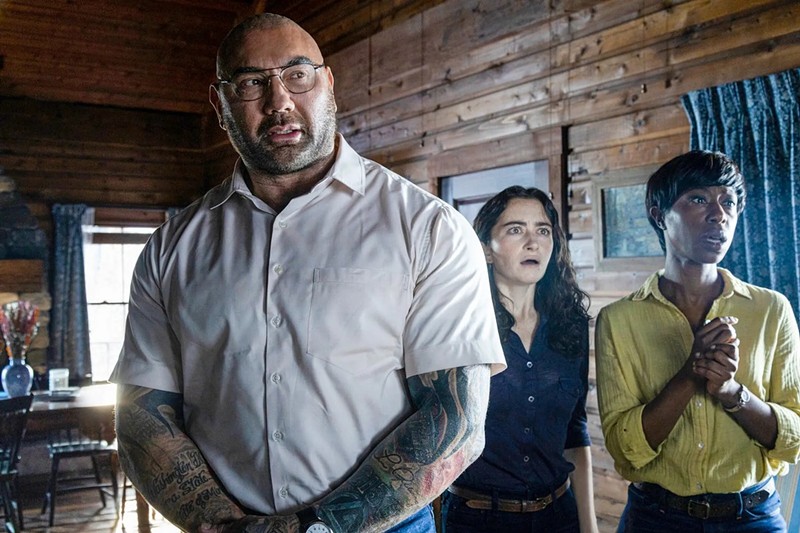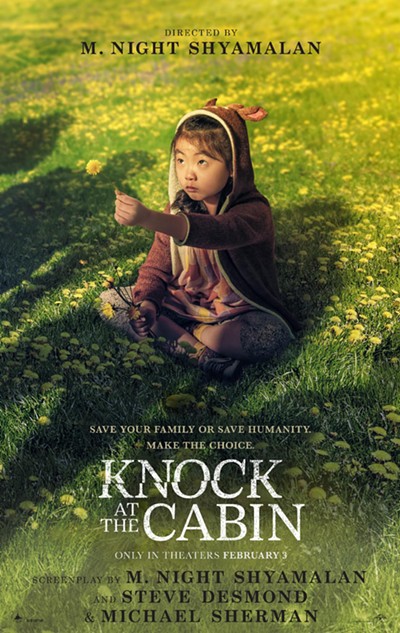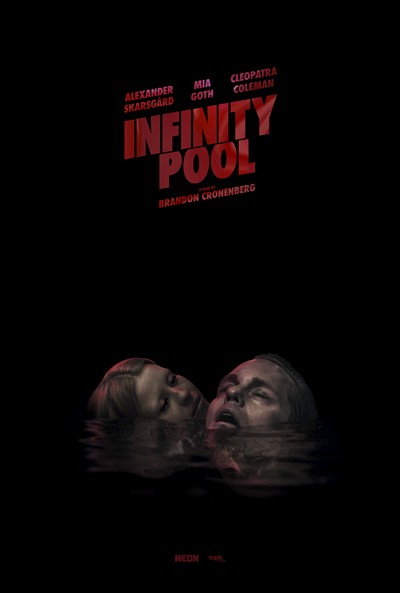We’re in something of a boomtime for vacation-centric films, and two new ones remain in rotation on local screens. The first, Infinity Pool, comes from Brandon Cronenberg (son of the better-known David) and was released in January; the second, Knock at the Cabin from M. Night Shyamalan and adapted from a book by Paul Tremblay, is only just out. Taking approaches which treat their central partnerships — their variously structured family units — as either sacred or profane but under threat in any case, the two exemplify divergent approaches to contemporary horror.
In today’s context, Infinity Pool may seem more familiar. Spotlighting a well-heeled couple vacationing on an isolated resort in scenic Li Tolqa, the imagined country serves as a crucial backdrop for the film. With Caribbean-level disjunctions prevalent between the class of people invited to spend time and money there and the shared resources of the broader (seemingly agrarian) local populace, the film both foregrounds and assails the immunizing levels of privilege enjoyed by its central cast.
Shortly after arriving, novelist James Foster (a typically wooden, recessive, and well-groomed Alexander Skarsgård) and his wealthy benefactress of a wife Em (Cleopatra Coleman in a limited, often indignant role) are ambushed by Gabi (Mia Goth), a visiting actress who announces herself as a one of James’s fans. Before long, they’re invited to dinner alongside Gabi’s lascivious husband Alban (Jalil Lespert) and then to a remote beach for a picnic the next day. This latter invitation is a violation of the resort compound’s principles of razor-wired sequestration, and after getting into trouble while outside the Fosters are confronted with the specter of consequences — after a fashion.
Entitled tourists causing trouble is an old standard for anywhere that hosts resort-based economies (the film was shot largely in Croatia), and Li Tolqa, which seems to be post-Soviet and central European, boasts traditions which account for it. Through fabulist means I won’t quite spoil, they’ve engineered a process which enables both well-heeled travelers cavorting out of line and traditionalist locals in favor of harsh punishments to have their respective cakes: a process which, on the surface, appears to create a sense of lasting political harmony if not particularly warm feeling.
While there’s a plain truth to Infinity Pool’s central conceit, which makes a far-flung locale a mere playpen for the wealthy traveler, there’s little wisdom in it. The film pointedly upends traditional narrative structure, too, replacing the threat of physical peril so common to horror with a different sort of trouble: a kind of hollowing, albeit empowering, variety of moral rot and psychological alteration. But there’s little space for modulation in this conceit, especially with Skarsgård as a lead. Offering little but strained posture and a seeming obedience to direction, he offers scant emotional expression here on screen.
To Gabi and company, perennial visitors all, the island’s dynamics are old but welcome and more freeing news, allowing for them to invite and, after a time, seduce James into a (to them) familiar way of being they take in gleeful stride. For Goth as Gabi, an interest in James proves both personal and determined; as such, Gabi’s invitations accrue a steadily heightening erotic charge. Taking the evolving position of a kind of younger, taunting mentor, Cronenberg’s scenario hands her all the film’s best stuff, allowing her to easily make the best case for watching. While others (like Cronenberg, or Skarsgård) treat the film’s landscape as a space of serious-minded satire and stiff political comment, they drain it of expression by doing so — which makes Goth’s gleeful ecstasies all the more a joy. Verging on camp in a way that recalls Harmony Korine’s own satire of entitlement Spring Breakers, her commitment both transcends and accentuates the film’s fine rote style, making it just barely worth the time.
Considerably less chilly in its affect but quite contemporary nonetheless, Shyamalan’s Knock at the Cabin is about all the things he’s long held dear. Privileging the family and its bonds above too much else, he casts a home invasion thriller (akin in many ways to his Signs, or more recently Jordan Peele’s Us) as not just threatening to their solidity but, while seemingly contained, potentially apocalyptic in scope. Opening on Wen (Kristen Cui), the adoptive daughter of Eric (Jonathan Groff) and Andrew (Ben Aldridge) catching grasshoppers on vacation, she’s soon met by hulking, gentle, and well-mannered Leonard (Dave Bautista). Leonard, after earnestly introducing himself, warns her that he’ll soon ask to enter their rented vacation home — not alone or for something casual, but to pursue the subject of a serious matter, accompanied by several peers.
This request — by a troupe of strangers wielding strangely homemade weapons — is understandably never granted, prompting the group to force their way into the house. After politely cleaning up the ensuing mess and subduing Wen and her parents, they present a grim proposition: the small family must agree to sacrifice — and themselves kill — one of their own three members in order to prevent global disasters of apocalyptic scale. Basing this ultimatum on, amid other interactions, a spate of shared visions and improbable coincidences, they struggle over many hours to convince their captives of the truth of what they’ve seen.
Pitting skepticism against a certain kind of faith (a frequent preoccupation for Shyamalan) as well as the intimate, richly sentimental bonds of family against those with a broader community, the film sees them strained still further by the two fathers’ sexual identity. Shyamalan treats this with surprising grace, breaking from the uncannily well-mannered intensity of the hostage scenes to explore key moments in the couple’s past — and the understandable ways in which, being marginalized (even as two white men), Andrew and Eric might be skeptical of these strangers’ dubious claims. Even beyond the violence of the task demanded of them, the family has better reason than most to be somewhat protectionist, trusting few people outside themselves.
Rooting the film — except for interspersed newscasts, a hoot of an infomercial, and the aforementioned flashbacks — within the rural Pennsylvania cabin, Shyamalan displays his signature skill at staging, blocking, and composing a staggering variety of kinds of shots. Moving between intense closeups with a razor-fine plane of focus (making for a sense of markedly subjective, POV-rooted engagement) and broad, sometimes rough-hewn, even blurry frames, Knock always finds energy in Shyamalan’s willingness to pursue visual experiments as he elaborates the film’s tensions from within its confined conceit and space. Whether engaging with Bautista’s empathetic, firm, but oddly tender delivery or the family’s shared defense of one another, Knock contains the most touching, emotionally credible work Shyamalan’s brought to screen for quite some time.
With a key cast of seven, each swiftly characterized (more naturalistically, I would say, than is his tendency), there’s a sense that everyone not only gets their due — but is treated, even during moments of violence, quite humanely. Benefitting from a prevailing lack of narrative sprawl and a well-honed sense of focus, it’s only, quite surprisingly, in the film’s late moments that it seems to run out of places to go: at a point where one might more naturally expect its field of possibilities to open up. For the most part, though, Knock remains a taut, humane, and angular work — and one better than the place it lands.
Film Details
Film Details
Coming soon: Metro Times Daily newsletter. We’ll send you a handful of interesting Detroit stories every morning. Subscribe now to not miss a thing.
Follow us: Google News | NewsBreak | Reddit | Instagram | Facebook | Twitter








